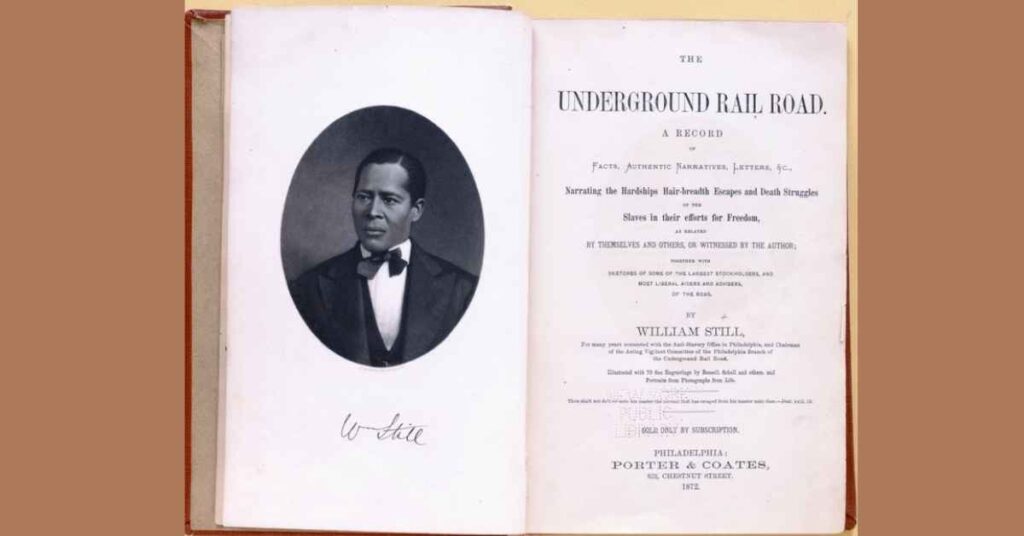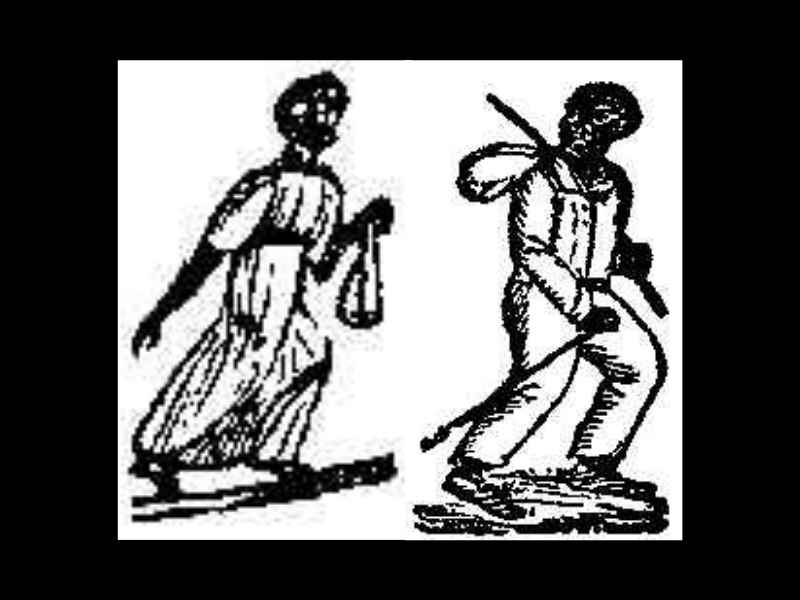This excerpt from William Still’s The Underground Rail Road documents a daring jailbreak after eight fugitives were betrayed by someone purporting to help them on their way.
Six men and two women fought their way out of a prison cell, jumped twelve feet from a window, and scaled a high wall to freedom.
Although there were eight people in the escaping party, William Still only had word on these six:
- Henry Predo
- Daniel Hughes
- Thomas Elliott
- Ann Johnson
- James and Lavinia Woolfley

Excerpt – Henry Predo
Henry fled from Buckstown, Dorchester Co., Md., March, 1857.
Physically he is a giant. About 27 years of age, stout and well-made, quite black, and no fool, as will appear presently.
Only a short time before he escaped, his master threatened to sell him south. To avoid that fate, therefore, he concluded to try his luck on the Underground Rail Road, and, in company with seven others—two of them females—he started for Canada.
For two or three days and nights they managed to outgeneral all their adversaries, and succeeded bravely in making the best of their way to a Free State.
In the meantime, however, a reward of $3,000 was offered for their arrest.
This temptation was too great to be resisted, even by the man who had been intrusted with the care of them, and who had faithfully promised to pilot them to a safe place.
One night, through the treachery of their pretended conductor, they were all taken into Dover Jail, where the Sheriff and several others, who had been notified beforehand by the betrayer, were in readiness to receive them.
Up stairs they were taken, the betrayer remarking as they were going up, that they were “cold, but would soon have a good warming.” On a light being lit they discovered the iron bars and the fact that they had been betrayed.
Their liberty-loving spirits and purposes, however, did not quail.
Though resisted brutally by the sheriff with revolver in hand, they made their way down one flight of stairs, and in the moment of excitement, as good luck would have it, plunged into the sheriff’s private apartment, where his wife and children were sleeping. The wife cried murder lustily.
A shovel full of fire, to the great danger of burning the premises, was scattered over the room; out of the window jumped two of the female fugitives.
Our hero Henry, seizing a heavy andiron, smashed out the window entire, through which the others leaped a distance of twelve feet.
The railing or wall around the jail, though at first it looked forbidding, was soon surmounted by a desperate effort.
At this stage of the proceedings, Henry found himself without the walls, and also lost sight of his comrades at the same time. The last enemy he spied was the sheriff in his stockings without his shoes.
He snapped his pistol at him, but it did not go off.
Six of the others, however, marvellously got off safely together; where the eighth went, or how he got off, was not known.
Excerpt – Daniel Hughes

Daniel fled from Buckstown, Dorchester Co., also. His owner’s name was Richard Meredith, a farmer. Daniel is one of the eight alluded to above.
In features he is well made, dark chestnut color, and intelligent, possessing an ardent thirst for liberty.
The cause of his escape was: “Worked hard in all sorts of weather—in rain and snow,” so he thought he would “go where colored men are free.”
His master was considered the hardest man around. His mistress was “eighty-three years of age,” “drank hard,” was “very stormy,” and a “member of the Methodist Church” (Airy’s meeting-house).
He left brothers and sisters, and uncles and aunts behind. In the combat at the prison he played his part manfully.
Excerpt – Thomas Elliott
Thomas is also one of the brave eight who broke out of Dover Jail.
He was about twenty-three years of age, well made, wide awake, and of a superb black complexion.
He too had been owned by Richard Meredith.
Against the betrayer, who was a black man, he had vengeance in store if the opportunity should ever offer. Thomas left only one brother living; his “father and mother were dead.”
The excitement over the escape spread very rapidly next morning, and desperate efforts were made to recapture the fugitives, but a few friends there were who had sympathy and immediately rendered them the needed assistance.
Excerpt – Notes And Letters
The appended note from the faithful Garrett to Samuel Rhoads, may throw light upon the occurrence to some extent.
WILMINGTON, 3d mo. 13th, 1857.
DEAR COUSIN, SAMUEL RHOADS:
I have a letter this day from an agent of the Underground Rail Road, near Dover, in this state, saying I must be on the look out for six brothers and two sisters, they were decoyed and betrayed, he says by a colored man named Thomas Otwell, who pretended to be their friend, and sent a white scamp ahead to wait for them at Dover till they arrived; they were arrested and put in Jail there, with Tom’s assistance, and some officers.
On third day morning about four o’clock, they broke jail; six of them are secreted in the neighborhood, and the writer has not known what became of the other two.
The six were to start last night for this place. I hear that their owners have persons stationed at several places on the road watching. I fear they will be taken.
If they could lay quiet for ten days or two weeks, they might then get up safe.
I shall have two men sent this evening some four or five miles below to keep them away from this town, and send them (if found to Chester County).
Thee may show this to Still and McKim, and oblige thy cousin,
THOMAS GARRETT.
Further light about this exciting contest, may be gathered from a colored conductor on the Road, in Delaware, who wrote as follows to a member of the Vigilance Committee at Philadelphia.
CAMDEN, DEL., March 23d, 1857.
DEAR SIR;
I tak my pen in hand to write to you, to inform you what we have had to go throw for the last two weaks.
Thir wir six men and two woman was betraid on the tenth of this month, thea had them in prison but thea got out was conveyed by a black man, he told them he wood bring them to my hows, as he wos told, he had ben ther Befor, he has com with Harrett, a woman that stops at my hous when she pases tow and throw yau.
You don’t no me I supos, the Rev. Thomas H. Kennard dos, or Peter Lowis.
He Road Camden Circuit, this man led them in dover prisin and left them with a whit man; but tha tour out the winders and jump out, so cum back to camden.
We put them throug, we hav to carry them 19 mils and cum back the sam night wich maks 38 mils. It is tou much for our littel horses. We must do the bes we can, ther is much Bisness dun on this Road.
We hay to go throw dover and smerny, the two wors places this sid of mary land lin. If you have herd or sean them ples let me no. I will Com to Phila be for long and then I will call and se you. There is much to do her.
Ples to wright, I Remain your frend,
WILLIAM BRINKLY.
Remember me to Thom. Kennard.
The balance of these brave fugitives, although not named in this connection, succeeded in getting off safely. But how the betrayer, sheriff and hunters got out of their dilemma, the Committee was never fully posted.
The Committee found great pleasure in assisting these passengers, for they had the true grit. Such were always doubly welcome.
Excerpt – Ann Johnson

As the way of travel, via the Underground Rail Road, under the most favorable circumstances, even for the sterner sex, was hard enough to test the strongest nerves, and to try the faith of the bravest of the brave, every woman, who won her freedom, by this perilous undertaking, deserves commemoration.
It is, therefore, a pleasure to thus transfer from the old Record book the names of Ann Johnson and Lavina Woolfley, who fled from Maryland in 1857. Their lives, however, had not been in any way very remarkable.
Ann was tall, and of a dark chestnut color, with an intelligent countenance, and about twenty-four years of age.
She had filled various situations as a Slave. Sometimes she was required to serve in the kitchen, at other times she was required to toil in the field, with the plow, hoe, and the like.
Samuel Harrington, of Cambridge District, Maryland, was the name of the man for whose benefit Ann labored during her younger days. She had no hesitation in saying, that he was a very “ill-natured man;” he however, was a member of the “old time Methodist Church.”
In Slave property he had invested only to the extent of some five or six head.
About three years previous to Ann’s escape, one of her brothers fled and went to Canada. This circumstance so enraged the owner, that he declared he would “sell all” he owned.
Accordingly Ann was soon put on the auction block, and was bought by a man who went by the name of William Moore.
Moore was a married man, who, with his wife, was addicted to intemperance and carousing. Ann found that she had simply got “out of the fire into the frying-pan.” She was really at a loss to tell when her lot was the harder, whether under the “rum drinker,” or the old time Methodist.
In this state of mind she decided to leave all and go to Canada, the refuge for the fleeing bondman.
Excerpt – Lavinia Woolfley
Lavina, Ann’s companion, was the wife of James Woolfley.
She and her husband set out together, with six others, and were of the party of eight who were betrayed into Dover jail, as has already been described in these pages.
After fighting their way out of the jail, they separated (for prudential reasons).
The husband of Lavina, immediately after the conflict at the jail, passed on to Canada, leaving his wife under the protection of friends.
Since that time several months had elapsed, but of each other nothing had been known, before she received information on her arrival at Philadelphia.
Source
The Underground Railroad by William Still was published in 1872.
The book is in the public domain. It can be found in the Library of Congress.